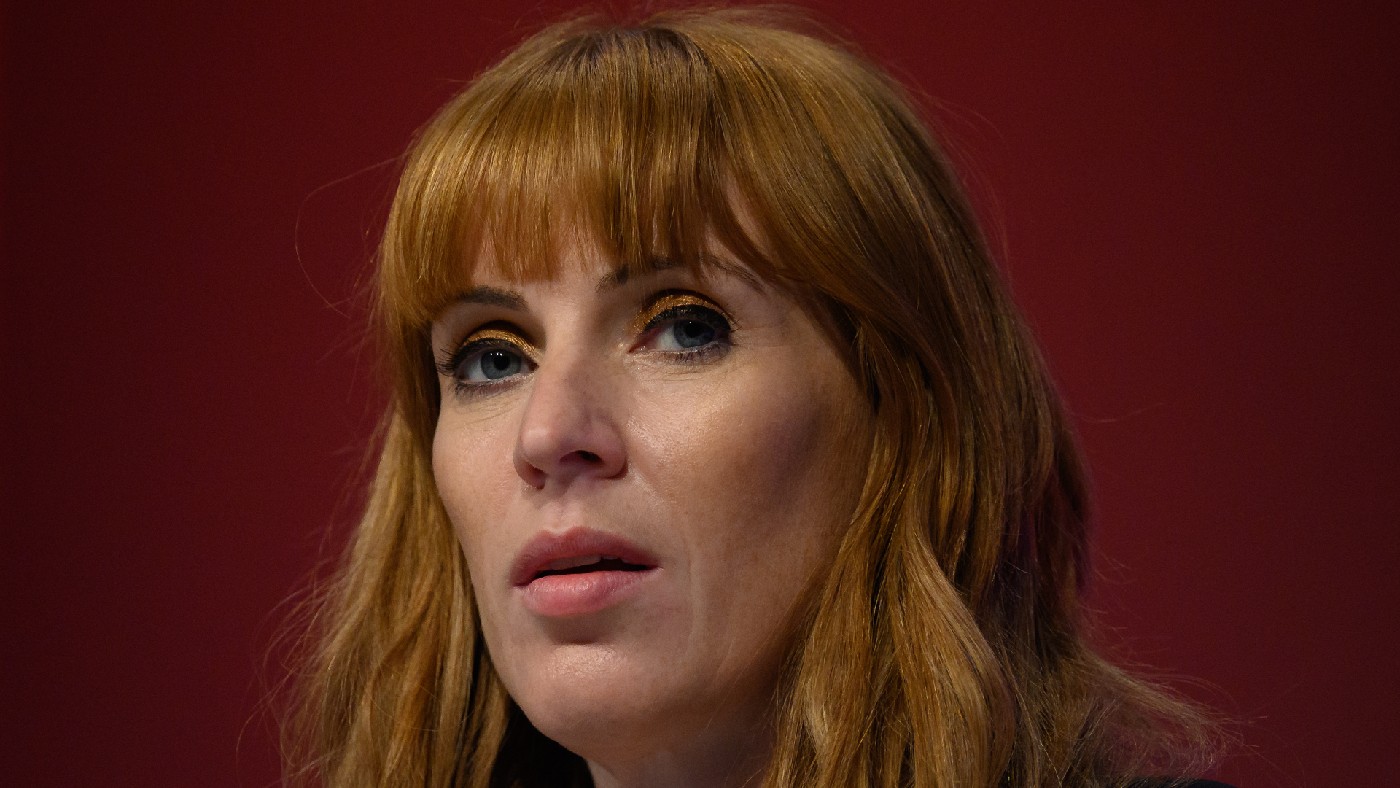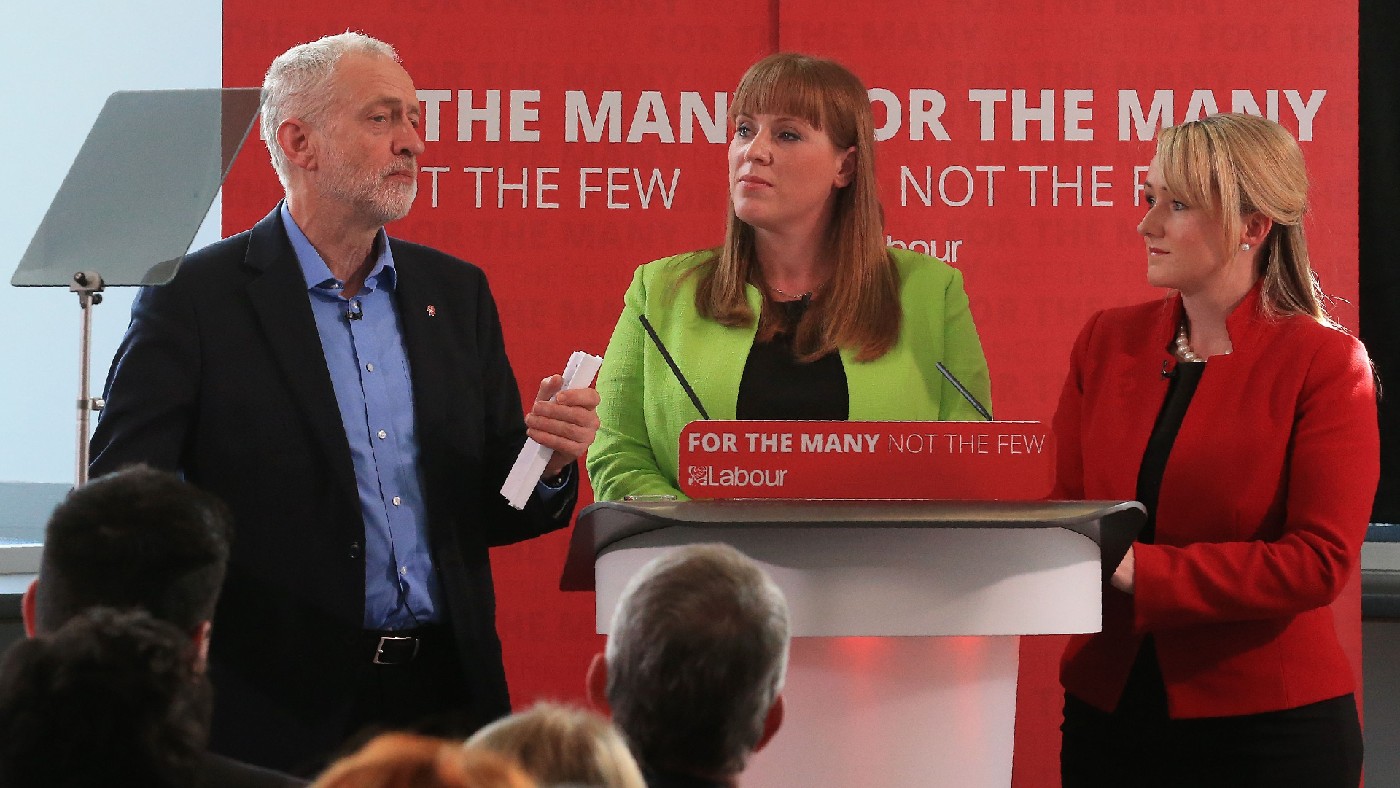Angela Rayner: from ‘mouthy’ union rep to Labour firebrand
Party’s deputy, who left school at 16 with no qualifications, now considered to be ‘a Labour leader in waiting’

A free daily email with the biggest news stories of the day – and the best features from TheWeek.com
You are now subscribed
Your newsletter sign-up was successful
Angela Rayner, Labour’s deputy leader, has made headlines this week after describing the Conversatives as “homophobic, racist, misogynistic, absolute vile… scum” during a speech at the party conference.
But despite drawing criticism, Rayner stood by her controversial comments, defending them as being made in the “street language” of her northern working-class roots, said The Guardian.
The MP for Ashton-under-Lyne is “turning into a bit of a cult figure”, wrote The Independent’s Sean O’Grady. “Here’s someone who says what she thinks and answers the questions, and with some wit. In that respect she is a novelty these days.”
The Week
Escape your echo chamber. Get the facts behind the news, plus analysis from multiple perspectives.

Sign up for The Week's Free Newsletters
From our morning news briefing to a weekly Good News Newsletter, get the best of The Week delivered directly to your inbox.
From our morning news briefing to a weekly Good News Newsletter, get the best of The Week delivered directly to your inbox.
Here’s what you need to know about Labour’s outspoken deputy leader – described by The Times as “one of the most powerful women at Westminster”.
Early life
Rayner’s working-class background couldn’t be further from the privileged upbringings that are so ubiquitous in British politics. Raised on a council estate in Stockport where she cared for her mother, who has bipolar disorder, she remembers her childhood as being “full of fear”.
“My mum wouldn’t be able to get up. She just didn’t have the motivation. I got bullied because my hair was always a mess,” she told The Times, adding: “That’s why my hair is always immaculate now.”
A free daily email with the biggest news stories of the day – and the best features from TheWeek.com
Rayner, 41, left her local comprehensive aged 16, pregnant and with no qualifications. With support from one of Labour’s Sure Start centres, she began working as a care worker for her local council. Her colleagues soon put her forward as a union rep. “I was mouthy,” she said, “and I would take no messing from management.”
Juggling motherhood and her union work, she quickly rose through the ranks, becoming northwest England’s most senior elected official in the public service union Unison.
As Rayner’s own website proudly explained: “Angela is not an Oxbridge-educated, former Special Adviser, professional politician.”

Political career
In 2015, Rayner became Ashton-under-Lyne’s first female MP – winning at her first attempt. “As the first woman MP, I promise that I will do all in my power to live up to the example shown by my predecessors,” she said in her maiden speech. “Of course I could never fill their shoes – mine tend to have three-inch heels and be rather more colourful.”
The topic of shoes came back to haunt Rayner six months after the election. Using official House of Commons paper, she wrote a letter of complaint to a Brighton shopkeeper who “failed to furnish her with a £175 pair of Star Wars-themed shoes”, said The Telegraph at the time.
The paper described the incident as “a bad case of ‘Do you know who I am?’ syndrome”.
But Rayner rose quickly under Jeremy Corbyn’s leadership, being promoted to shadow education secretary in 2016. “She is a true believer in everybody having access to education,” Unison’s Stephanie Thomas told Mark Coles on BBC Radio 4’s Profile. “She did a fantastic job because she knew what it was like to be a child who was left behind.”
Leadership race
When Corbyn stepped down in 2020, Rayner stood for deputy leader of the Labour Party, running with her then flatmate Rebecca Long-Bailey as leader.
“It is no secret [that] for years me and Rebecca Long-Bailey have been good friends and I wasn’t going to stand for leader and allow everyone in the media and everyone outside saying ‘who is the better woman?’” she said ahead of the leadership race.
Long-Bailey lost out to Keir Starmer but Rayner won with a landslide victory, replacing Tom Watson, who stood down as an MP before the election.

In May this year Starmer handed Rayner a promotion in the reshuffle of his shadow cabinet, making her the shadow chancellor of the Duchy of Lancaster and the shadow secretary for the future of work, a newly created post.
But it came after the Labour leader had initially offered his deputy a frontbench role covering the social care brief, The Guardian reported. Rayner rejected it, regarding it as “a significant demotion” from party chair and national campaigns co-ordinator. “I hold my ground about everything,” she told The Times. “It wasn’t about Keir; it’s just how I am.”
The next Labour leader?
Rayner is considered by many to be “a Labour leader in waiting”, said the BBC’s Coles. Some feel that Starmer’s decision to propose a rule change giving MPs more sway over leadership elections – backed at the last minute by Unison on Sunday – came from fears of a leadership challenge.
“Now I know why Keir Starmer wanted to go on what looked like his wild goose chase to change the rules for electing a Labour leader: Angiemania,” wrote O’Grady in The Independent.
But, as The Spectator’s Katy Balls told Coles, Rayner’s outspoken nature has negatively affected her popularity in Westminster, making her less of a threat to Starmer than she may seem.
“The party and particularly Keir Starmer want to move past this idea of Labour hating the Tories, of rough politics… and [her] comment [calling the Tories scum] was seen as very unhelpful by senior figures.”
And what does Rayner think about potentially becoming the party’s first female leader? “I definitely wouldn’t say no, because if I said that, then I’m just being lame, like other people”, she told The Times.
“I think it’s an absolute privilege to do it, so I would see it as a duty. If I felt that it was the right thing to do for the party and the right thing for the country, then I would step up and do it.”
Kate Samuelson is The Week's former newsletter editor. She was also a regular guest on award-winning podcast The Week Unwrapped. Kate's career as a journalist began on the MailOnline graduate training scheme, which involved stints as a reporter at the South West News Service's office in Cambridge and the Liverpool Echo. She moved from MailOnline to Time magazine's satellite office in London, where she covered current affairs and culture for both the print mag and website. Before joining The Week, Kate worked at ActionAid UK, where she led the planning and delivery of all content gathering trips, from Bangladesh to Brazil. She is passionate about women's rights and using her skills as a journalist to highlight underrepresented communities. Alongside her staff roles, Kate has written for various magazines and newspapers including Stylist, Metro.co.uk, The Guardian and the i news site. She is also the founder and editor of Cheapskate London, an award-winning weekly newsletter that curates the best free events with the aim of making the capital more accessible.
-
 What to know before filing your own taxes for the first time
What to know before filing your own taxes for the first timethe explainer Tackle this financial milestone with confidence
-
 The biggest box office flops of the 21st century
The biggest box office flops of the 21st centuryin depth Unnecessary remakes and turgid, expensive CGI-fests highlight this list of these most notorious box-office losers
-
 What are the best investments for beginners?
What are the best investments for beginners?The Explainer Stocks and ETFs and bonds, oh my
-
 How corrupt is the UK?
How corrupt is the UK?The Explainer Decline in standards ‘risks becoming a defining feature of our political culture’ as Britain falls to lowest ever score on global index
-
 Reforming the House of Lords
Reforming the House of LordsThe Explainer Keir Starmer’s government regards reform of the House of Lords as ‘long overdue and essential’
-
 How long can Keir Starmer last as Labour leader?
How long can Keir Starmer last as Labour leader?Today's Big Question Pathway to a coup ‘still unclear’ even as potential challengers begin manoeuvring into position
-
 The high street: Britain’s next political battleground?
The high street: Britain’s next political battleground?In the Spotlight Mass closure of shops and influx of organised crime are fuelling voter anger, and offer an opening for Reform UK
-
 Is a Reform-Tory pact becoming more likely?
Is a Reform-Tory pact becoming more likely?Today’s Big Question Nigel Farage’s party is ahead in the polls but still falls well short of a Commons majority, while Conservatives are still losing MPs to Reform
-
 The launch of Your Party: how it could work
The launch of Your Party: how it could workThe Explainer Despite landmark decisions made over the party’s makeup at their first conference, core frustrations are ‘likely to only intensify in the near-future’
-
 What does the fall in net migration mean for the UK?
What does the fall in net migration mean for the UK?Today’s Big Question With Labour and the Tories trying to ‘claim credit’ for lower figures, the ‘underlying picture is far less clear-cut’
-
 Will the public buy Rachel Reeves’s tax rises?
Will the public buy Rachel Reeves’s tax rises?Today’s Big Question The Chancellor refused to rule out tax increases in her televised address, and is set to reverse pledges made in the election manifesto